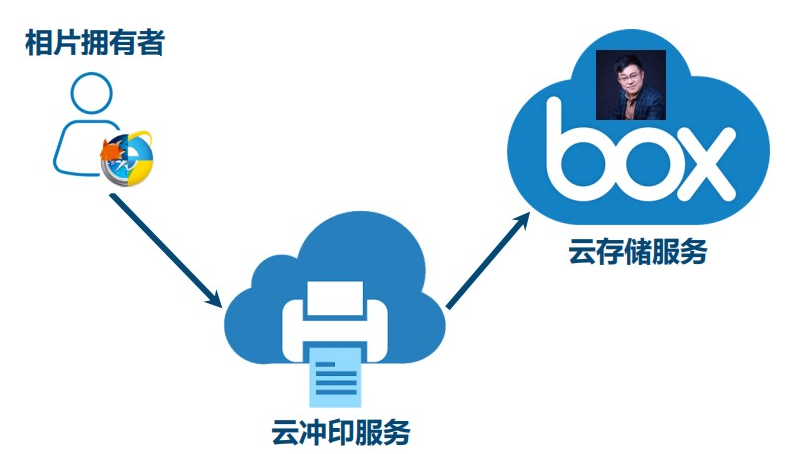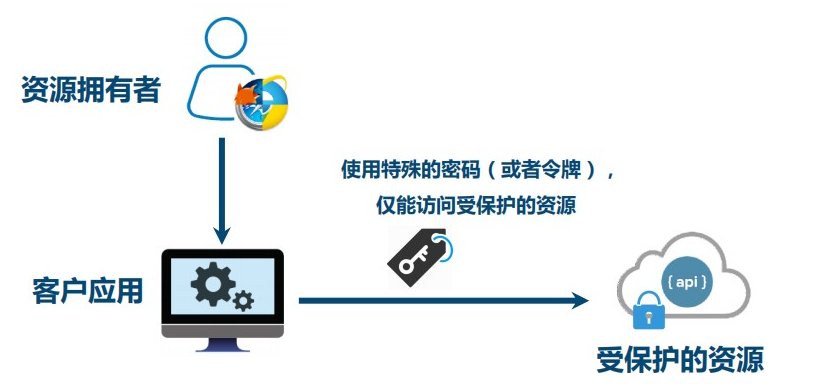标签:eric 攻击 hat lock cti 格式 this group lan
OAuth2.0是OAuth协议的延续版本,但不向前兼容OAuth 1.0(即完全废止了OAuth1.0)。 OAuth 2.0关注客户端开发者的简易性。要么通过组织在资源拥有者和HTTP服务商之间的被批准的交互动作代表用户,要么允许第三方应用代表用户获得访问的权限。同时为Web应用,桌面应用和手机,和起居室设备提供专门的认证流程。2012年10月,OAuth 2.0协议正式发布为RFC 。
OAuth2.0主要可以解决两个问题
就比如当我们把照片存储在百度网盘,而我们现在需要使用第三方工具进行打印照片,这个时候第三方服务是没有操作权限的,我们就可以使用OAuth2.0进行授权

方式一:用户名密码复制
适用于同一公司内部的多个系统,不适用于不受信的第三方应用(不采取)
方式二:通用开发者key
适用于合作商或者授信的不同业务部门之间(不推荐)
方式三:令牌机制
按照一定规则生成字符串,字符串包含用户信息。接近OAuth2方式,需要考虑如何管理令牌、颁发令牌、吊销令牌,需要统一的协议,因此就有了OAuth2协议

OAuth并没有支持 http 以外的协议
OAuth并不是一个认证协议
OAuth并没有定义授权处理机制
OAuth并没有定义token格式
OAuth2.0并没有定义加密算法
OAuth2.0并不是单个协议
OAuth2.0仅是授权框架,用于授权代理
首先进入微信开放平台 https://open.weixin.qq.com/ 注册账号——>激活邮箱——>完善开发者资料——>开发者资质认证——>创建网站应用——>需要域名地址
添加配置
在application.properties中添加相关配置
# 微信开放平台 appid wx.open.app_id=你的appid # 微信开放平台 appsecret wx.open.app_secret=你的appsecret # 微信开放平台 重定向url wx.open.redirect_url=http://你的服务器名称/api/ucenter/wx/callback
然后创建工具类,读取配置文件信息
@Component public class ConstantWxUtils implements InitializingBean { @Value("${wx.open.app_id}") private String app_id; @Value("${wx.open.app_secret}") private String app_secret; @Value("${wx.open.redirect_url}") private String redirect_url; //定义常量,为了能够使用 public static String WX_OPEN_APP_ID; public static String WX_OPEN_APP_SECRET; public static String WX_OPEN_REDIRECT_URL; @Override public void afterPropertiesSet() throws Exception { WX_OPEN_APP_ID = app_id; WX_OPEN_APP_SECRET = app_secret; WX_OPEN_REDIRECT_URL = redirect_url; } }
生成微信扫描二维码
直接请求微信提供的固定的地址,向地址后拼接参数
编写controller实现二维码生成
/** * @Author Eric * @Date 2021/5/16 13:55 * @Version 1.0 */ @Controller @CrossOrigin @RequestMapping("/educenter/wx") public class WxApiController { @GetMapping("login") public String getWxCode(){ // 微信开放平台授权baseUrl String baseUrl = "https://open.weixin.qq.com/connect/qrconnect" + "?appid=%s" + "&redirect_uri=%s" + "&response_type=code" + "&scope=snsapi_login" + "&state=%s" + "#wechat_redirect"; //对redirect_url进行URLEncoder编码 String redirectUrl = ConstantWxUtils.WX_OPEN_REDIRECT_URL; try { redirectUrl = URLEncoder.encode(redirectUrl, "utf-8"); } catch (Exception e) { e.printStackTrace(); } // 防止csrf攻击(跨站请求伪造攻击) //String state = UUID.randomUUID().toString().replaceAll("-", "");//一般情况下会使用一个随机数 String state = "imhelen";//为了让大家能够使用我搭建的外网的微信回调跳转服务器,这里填写你在ngrok的前置域名 System.out.println("state = " + state); String ericUrl = String.format( baseUrl, ConstantWxUtils.WX_OPEN_APP_ID, ConstantWxUtils.WX_OPEN_REDIRECT_URL, "Eric", redirectUrl ); return "redirect:"+ericUrl; } }
url拼接参数说明:
| 参数 | 是否必须 | 说明 |
| appid | 是 | 应用唯一标识 |
| redirect_uri | 是 | 请使用urlEncode对链接进行处理 |
| response_type | 是 | 填code |
| scope | 是 | 应用授权作用域,拥有多个作用域用逗号(,)分隔,网页应用目前仅填写snsapi_login即 |
| state | 否 | 用于保持请求和回调的状态,授权请求后原样带回给第三方。该参数可用于防止csrf攻击(跨站请求伪造攻击),建议第三方带上该参数,可设置为简单的随机数加session进行校验 |
当我们扫描二维码就获得一个跳转路径,http://localhost:8150/api/ucenter/wx/callback?code=041GPEll2ZKq374VdOml28mM7F3GPElm&state=Eric 我们可以清楚的看到该路径的端口号和url信息,端口号的8150 ,这是我们需要更改自己的项目端口号为 8150,更改 url为 api/ucenter/wx/callback 在controller层添加如下代码,获取用户信息
在这里需要使用httpclient技术来访问url获取数据,但不执行跳转
这里我们首先要引入依赖
<!--httpclient-->
<dependency>
<groupId>org.apache.httpcomponents</groupId>
<artifactId>httpclient</artifactId>
</dependency>
<!--commons-io-->
<dependency>
<groupId>commons-io</groupId>
<artifactId>commons-io</artifactId>
<version>1.4</version>
</dependency>
<!--gson-->
<dependency>
<groupId>com.google.code.gson</groupId>
<artifactId>gson</artifactId>
</dependency>
然后创建工具类HttpClientUtils.java

package com.gh.mp.eduservice.util; import org.apache.commons.io.IOUtils; import org.apache.commons.lang3.StringUtils; import org.apache.http.Consts; import org.apache.http.HttpEntity; import org.apache.http.HttpResponse; import org.apache.http.NameValuePair; import org.apache.http.client.HttpClient; import org.apache.http.client.config.RequestConfig; import org.apache.http.client.config.RequestConfig.Builder; import org.apache.http.client.entity.UrlEncodedFormEntity; import org.apache.http.client.methods.HttpGet; import org.apache.http.client.methods.HttpPost; import org.apache.http.conn.ConnectTimeoutException; import org.apache.http.conn.ssl.SSLConnectionSocketFactory; import org.apache.http.conn.ssl.SSLContextBuilder; import org.apache.http.conn.ssl.TrustStrategy; import org.apache.http.conn.ssl.X509HostnameVerifier; import org.apache.http.entity.ContentType; import org.apache.http.entity.StringEntity; import org.apache.http.impl.client.CloseableHttpClient; import org.apache.http.impl.client.HttpClients; import org.apache.http.impl.conn.PoolingHttpClientConnectionManager; import org.apache.http.message.BasicNameValuePair; import javax.net.ssl.SSLContext; import javax.net.ssl.SSLException; import javax.net.ssl.SSLSession; import javax.net.ssl.SSLSocket; import java.io.IOException; import java.net.SocketTimeoutException; import java.security.GeneralSecurityException; import java.security.cert.CertificateException; import java.security.cert.X509Certificate; import java.util.ArrayList; import java.util.List; import java.util.Map; import java.util.Map.Entry; import java.util.Set; /** * 依赖的jar包有:commons-lang-2.6.jar、httpclient-4.3.2.jar、httpcore-4.3.1.jar、commons-io-2.4.jar * @author zhaoyb * */ public class HttpClientUtils { public static final int connTimeout=10000; public static final int readTimeout=10000; public static final String charset="UTF-8"; private static HttpClient client = null; static { PoolingHttpClientConnectionManager cm = new PoolingHttpClientConnectionManager(); cm.setMaxTotal(128); cm.setDefaultMaxPerRoute(128); client = HttpClients.custom().setConnectionManager(cm).build(); } public static String postParameters(String url, String parameterStr) throws ConnectTimeoutException, SocketTimeoutException, Exception{ return post(url,parameterStr,"application/x-www-form-urlencoded",charset,connTimeout,readTimeout); } public static String postParameters(String url, String parameterStr,String charset, Integer connTimeout, Integer readTimeout) throws ConnectTimeoutException, SocketTimeoutException, Exception{ return post(url,parameterStr,"application/x-www-form-urlencoded",charset,connTimeout,readTimeout); } public static String postParameters(String url, Map<String, String> params) throws ConnectTimeoutException, SocketTimeoutException, Exception { return postForm(url, params, null, connTimeout, readTimeout); } public static String postParameters(String url, Map<String, String> params, Integer connTimeout,Integer readTimeout) throws ConnectTimeoutException, SocketTimeoutException, Exception { return postForm(url, params, null, connTimeout, readTimeout); } public static String get(String url) throws Exception { return get(url, charset, null, null); } public static String get(String url, String charset) throws Exception { return get(url, charset, connTimeout, readTimeout); } /** * 发送一个 Post 请求, 使用指定的字符集编码. * * @param url * @param body RequestBody * @param mimeType 例如 application/xml "application/x-www-form-urlencoded" a=1&b=2&c=3 * @param charset 编码 * @param connTimeout 建立链接超时时间,毫秒. * @param readTimeout 响应超时时间,毫秒. * @return ResponseBody, 使用指定的字符集编码. * @throws ConnectTimeoutException 建立链接超时异常 * @throws SocketTimeoutException 响应超时 * @throws Exception */ public static String post(String url, String body, String mimeType,String charset, Integer connTimeout, Integer readTimeout) throws ConnectTimeoutException, SocketTimeoutException, Exception { HttpClient client = null; HttpPost post = new HttpPost(url); String result = ""; try { if (StringUtils.isNotBlank(body)) { HttpEntity entity = new StringEntity(body, ContentType.create(mimeType, charset)); post.setEntity(entity); } // 设置参数 Builder customReqConf = RequestConfig.custom(); if (connTimeout != null) { customReqConf.setConnectTimeout(connTimeout); } if (readTimeout != null) { customReqConf.setSocketTimeout(readTimeout); } post.setConfig(customReqConf.build()); HttpResponse res; if (url.startsWith("https")) { // 执行 Https 请求. client = createSSLInsecureClient(); res = client.execute(post); } else { // 执行 Http 请求. client = HttpClientUtils.client; res = client.execute(post); } result = IOUtils.toString(res.getEntity().getContent(), charset); } finally { post.releaseConnection(); if (url.startsWith("https") && client != null&& client instanceof CloseableHttpClient) { ((CloseableHttpClient) client).close(); } } return result; } /** * 提交form表单 * * @param url * @param params * @param connTimeout * @param readTimeout * @return * @throws ConnectTimeoutException * @throws SocketTimeoutException * @throws Exception */ public static String postForm(String url, Map<String, String> params, Map<String, String> headers, Integer connTimeout,Integer readTimeout) throws ConnectTimeoutException, SocketTimeoutException, Exception { HttpClient client = null; HttpPost post = new HttpPost(url); try { if (params != null && !params.isEmpty()) { List<NameValuePair> formParams = new ArrayList<NameValuePair>(); Set<Entry<String, String>> entrySet = params.entrySet(); for (Entry<String, String> entry : entrySet) { formParams.add(new BasicNameValuePair(entry.getKey(), entry.getValue())); } UrlEncodedFormEntity entity = new UrlEncodedFormEntity(formParams, Consts.UTF_8); post.setEntity(entity); } if (headers != null && !headers.isEmpty()) { for (Entry<String, String> entry : headers.entrySet()) { post.addHeader(entry.getKey(), entry.getValue()); } } // 设置参数 Builder customReqConf = RequestConfig.custom(); if (connTimeout != null) { customReqConf.setConnectTimeout(connTimeout); } if (readTimeout != null) { customReqConf.setSocketTimeout(readTimeout); } post.setConfig(customReqConf.build()); HttpResponse res = null; if (url.startsWith("https")) { // 执行 Https 请求. client = createSSLInsecureClient(); res = client.execute(post); } else { // 执行 Http 请求. client = HttpClientUtils.client; res = client.execute(post); } return IOUtils.toString(res.getEntity().getContent(), "UTF-8"); } finally { post.releaseConnection(); if (url.startsWith("https") && client != null && client instanceof CloseableHttpClient) { ((CloseableHttpClient) client).close(); } } } /** * 发送一个 GET 请求 * * @param url * @param charset * @param connTimeout 建立链接超时时间,毫秒. * @param readTimeout 响应超时时间,毫秒. * @return * @throws ConnectTimeoutException 建立链接超时 * @throws SocketTimeoutException 响应超时 * @throws Exception */ public static String get(String url, String charset, Integer connTimeout,Integer readTimeout) throws ConnectTimeoutException,SocketTimeoutException, Exception { HttpClient client = null; HttpGet get = new HttpGet(url); String result = ""; try { // 设置参数 Builder customReqConf = RequestConfig.custom(); if (connTimeout != null) { customReqConf.setConnectTimeout(connTimeout); } if (readTimeout != null) { customReqConf.setSocketTimeout(readTimeout); } get.setConfig(customReqConf.build()); HttpResponse res = null; if (url.startsWith("https")) { // 执行 Https 请求. client = createSSLInsecureClient(); res = client.execute(get); } else { // 执行 Http 请求. client = HttpClientUtils.client; res = client.execute(get); } result = IOUtils.toString(res.getEntity().getContent(), charset); } finally { get.releaseConnection(); if (url.startsWith("https") && client != null && client instanceof CloseableHttpClient) { ((CloseableHttpClient) client).close(); } } return result; } /** * 从 response 里获取 charset * * @param ressponse * @return */ @SuppressWarnings("unused") private static String getCharsetFromResponse(HttpResponse ressponse) { // Content-Type:text/html; charset=GBK if (ressponse.getEntity() != null && ressponse.getEntity().getContentType() != null && ressponse.getEntity().getContentType().getValue() != null) { String contentType = ressponse.getEntity().getContentType().getValue(); if (contentType.contains("charset=")) { return contentType.substring(contentType.indexOf("charset=") + 8); } } return null; } /** * 创建 SSL连接 * @return * @throws GeneralSecurityException */ private static CloseableHttpClient createSSLInsecureClient() throws GeneralSecurityException { try { SSLContext sslContext = new SSLContextBuilder().loadTrustMaterial(null, new TrustStrategy() { public boolean isTrusted(X509Certificate[] chain,String authType) throws CertificateException { return true; } }).build(); SSLConnectionSocketFactory sslsf = new SSLConnectionSocketFactory(sslContext, new X509HostnameVerifier() { @Override public boolean verify(String arg0, SSLSession arg1) { return true; } @Override public void verify(String host, SSLSocket ssl) throws IOException { } @Override public void verify(String host, X509Certificate cert) throws SSLException { } @Override public void verify(String host, String[] cns, String[] subjectAlts) throws SSLException { } }); return HttpClients.custom().setSSLSocketFactory(sslsf).build(); } catch (GeneralSecurityException e) { throw e; } } public static void main(String[] args) { try { String str= post("https://localhost:443/ssl/test.shtml","name=12&page=34","application/x-www-form-urlencoded", "UTF-8", 10000, 10000); //String str= get("https://localhost:443/ssl/test.shtml?name=12&page=34","GBK"); /*Map<String,String> map = new HashMap<String,String>(); map.put("name", "111"); map.put("page", "222"); String str= postForm("https://localhost:443/ssl/test.shtml",map,null, 10000, 10000);*/ System.out.println(str); } catch (ConnectTimeoutException e) { // TODO Auto-generated catch block e.printStackTrace(); } catch (SocketTimeoutException e) { // TODO Auto-generated catch block e.printStackTrace(); } catch (Exception e) { // TODO Auto-generated catch block e.printStackTrace(); } } }
获取扫描人信息
@GetMapping("callback")
public String callback(String code,String state){
try {
//那种code请求微信固定地址,得到两个值access_token和openid
String baseAccessTokenUrl = "https://api.weixin.qq.com/sns/oauth2/access_token" +
"?appid=%s" +
"&secret=%s" +
"&code=%s" +
"&grant_type=authorization_code";
String accessTokenUrl = String.format(baseAccessTokenUrl,
ConstantWxUtils.WX_OPEN_APP_ID,
ConstantWxUtils.WX_OPEN_APP_SECRET,
code);
//请求拼接好的地址,得到两个值access_token和openid使用httpclient技术
String accessTokenInfo = HttpClientUtils.get(accessTokenUrl);
Gson gson=new Gson();
HashMap mapAccessToken = gson.fromJson(accessTokenInfo, HashMap.class);
String accessToken = (String) mapAccessToken.get("access_token");
String openid = (String) mapAccessToken.get("openid");
//拿着access_token和openid再去请求微信提供的固定地址,获取扫描人信息
String baseUserInfoUrl = "https://api.weixin.qq.com/sns/userinfo" +
"?access_token=%s" +
"&openid=%s";
String userInfoUrl = String.format(baseUserInfoUrl, accessToken, openid);
//发送请求
String userInfo = HttpClientUtils.get(userInfoUrl);
HashMap<String,String> userInfoMap= gson.fromJson(userInfo, HashMap.class);
String nickname = userInfoMap.get("nickname");//昵称
String headimgurl = userInfoMap.get("headimgurl");//头像
}catch (Exception e){
e.printStackTrace();
}
return "redirect:http://localhost:3000";
}
前端页面显示用户信息
//微信登录显示 wechatLogin(){ //把token值放到cookie里面 cookie.set(‘edu_token‘, this.token, { domain: ‘localhost‘ }) cookie.set(‘edu_ucenter‘, ‘‘, { domain: ‘localhost‘ }) getLoginUserInfo().then(res=>{ this.loginInfo = res.data.data.userInfo //将用户信息记录cookie cookie.set(‘edu_ucenter‘, this.loginInfo, { domain: ‘localhost‘ }) }) }
标签:eric 攻击 hat lock cti 格式 this group lan
原文地址:https://www.cnblogs.com/fqh2020/p/14774580.html